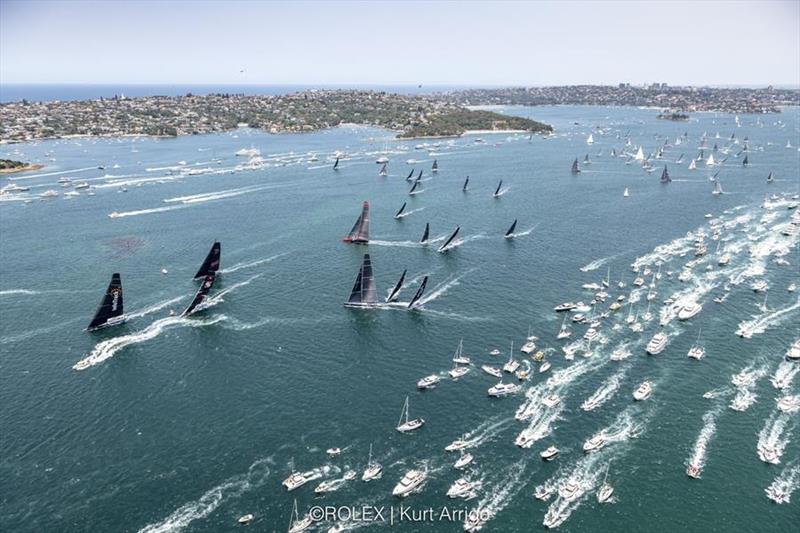
Sydney Hobart – just who's won
by John Curnow, Editor, Sail-World AUS 26 Dec 2022 09:15 AEDT

A strong Rolex Sydney Hobart fleet is set to light up Sydney Harbour again this Boxing Day © Rolex / Kurt Arrig
The fog that has enveloped Sydney’s world famous harbour is quite literally the best place to start our coverage of the 2022 Sydney to Hobart Yacht Race. As the morning’s light came up, its density even precluded the ferries from running. Just like the fog, things will lift and clear, and we’ll be making sure you have all the material here at Sail-World.com to provide luminescence, clarity and contrast.
It also serves to shines brightly on the first of several major points to consider at all times during the event. In Australia at this time of year, change is the only constant. In the South, there was snow down to 700m occurring but a week ago, temperatures were brisk at best, and the wind was the variety that went through you, not around.
Now only a few years ago, it was bushfire smoke that rendered vision nigh on impossible, and cancelled the SOLAS Big Boat Race, with deep concerns being raised for the start of the big race itself about a week later. After a very, very wet period, sudden high temperatures into the low 40 degree Celsius range could see bushfire affect things once more, and should it be in Tasmania, then coastal navigation can become even more challenging.
At this point too, we should give a huge shout out to our North American readers, even if they cannot access us for now, and hope that they survive the cold, keep warmth in their hearts, and somehow smiles on their dials.
So the second big thing to remember and ponder is that in order to finish first, first you have to finish.
All this talk of race records and sleigh rides to Hobart is terrific, but the toll on standing rigging to sails, running rigging to crew can be anything from significant to catastrophic. Coming off a wave, stopping at the bottom of it, and have the rig keeping on going is not going to get you into Ye Olde Hobart Town anytime soon.
Large mains can have 20-30 tonne in the clew, so you had better look after it, for you only have the one. Do hope you have practised your reefing, for this is a time when many a main gets sliced like a package being opened with a box cutter. Similarly, going out for Chinese can be a terrific giggle on land, but at sea it can be a monumental calamity. The only thing you want to see that burns kerosene are the canaries at 33,000 feet, and not the whirly birds at less than 100.
Driving at pace is both exceptionally wonderful and joyous, and deeply challenging. Sometimes 45 minutes on the wheel is more than enough, and you have to dial yourself in beforehand, and wait for the incoming helmer to tap you on the shoulder before you can step aside. Add in the extra pressure of the dark hours, and it becomes one of those ocean racing definition moments – long periods of boredom interspersed with moments of sheer terror.
Consider as well, the two-handers. Many have autopilots that are not suited to this kind of work, so it is hand steer only, and you have to do nav, skeds, sail changes, cook, sleep etc etc amongst it all too. Last year, Disko Trooper was just some four hours and change outside of taking the prized Tattersall Cup itself, so if one of the 22 crews can come close this year, at least they are now finally allowed to consider that particular dream.
Speed equals distance over time. Indeed it does, and we are not going to get into Year 11 Physics, but the tracker merely takes the boat’s average speed, and the distance to go (DTG) to give you an idea of when it might arrive. It is a semblance of a notion, and to be taken with not merely a grain of salt, but rather a full packet.
This year the boats’ tracks will be much closer to the 628nm of the course, but the actual distance travelled to get there will always be ‘a little bit more’, or the complete milk run.
Equally, it accounts for nothing of the above, nor the other biggie. Weather. Yes. The companionway hatch has not failed a Navigator yet, and is very much unlikely ever to do so. There are a couple of transitions to deal with for the race period, and the slower craft may well feel the brunt of something that will likely develop in the Great Australian Bight from late on Tuesday and into Wednesday, taking things from mild Northerlies into first Nor’westers, then ultimately fresh to frightening Sou’westers, and did we mention the rain? Yummy. It should pass quickly enough, but is likely to have definitely made its presence felt whilst around. Reminds one of certain relatives at Christmas time, does it not?
We’ll have more to say about the weather thing as we go along. In the meantime, all the best to the crews, happy reading to all their family and friends, and best wishes to all.
Stay safe, thanks for tuning into Sail-World.com, and all the best for 2023.